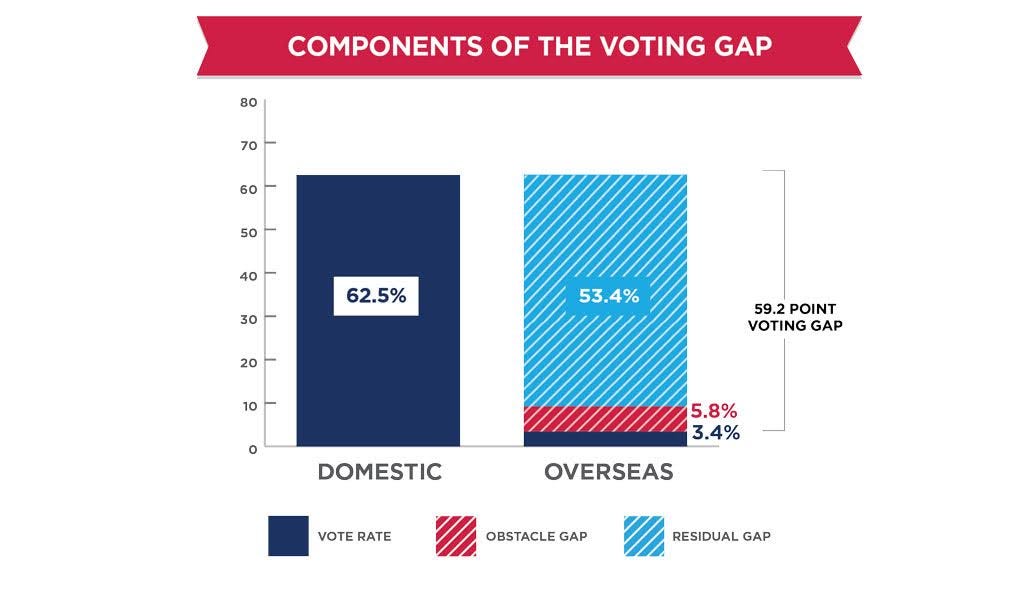Recently, an acronym relatively unknown by the general public, has taken hold of those trying to preemptively sow distrust in America’s democracy: UOCAVA voters. The Uniformed and Overseas Citizens Absentee Voting Act (UOCAVA) is a provision of federal law that provides voting protections to U.S. citizens serving active military duty and other U.S. citizens living or working abroad. Issue One intern Abigail Gaetz, a 22-year-old Rhode Island native, experienced firsthand the value and importance of being able to exercise her vote while living abroad and has shared her experience with us.
In 2022, I cast my ballot for the November general elections in Rhode Island. Since I was 18, I had been voting consistently in every election and, despite studying abroad in Ireland that year, I wasn’t going to pass up my civic duty.
Coming of age during the pandemic, and promptly moving to Washington D.C. after high school, I was familiar with requesting my mail-in ballot for each election. Requesting my international ballot wasn’t much different. Ahead of the election, I simply visited my state’s secretary of state website where I navigated to the “who can vote by mail” section. From there, I was prompted to follow the step-by-step guide on FVAP.gov to register and request an overseas ballot. My home state of Rhode Island allows this process to be completed virtually, accepting digital copies of both the federal write-in absentee ballot (FWAB) and my ballot through email. Thus, the process of casting my ballot internationally was seamless!
While midterm elections receive relatively low voter turnout compared to federal election years, in 2022 I was not only voting for my federal representatives, but also my governor, state representatives, and critical ballot measures. Voting is my way of influencing policy issues that matter to me most, electing representatives I trust to make decisions on my behalf. Despite living in Washington for university, and studying abroad for multiple semesters, I still maintain a strong connection to my home state, recognizing that how I cast my vote has an impact on myself and my communities at home. That is why, every election year, I do my best to make sure my vote is counted and my vote is heard!
Of the 4.4 million non-military U.S. citizens living overseas, 2.8 million are estimated to be eligible to vote (over 18 years old). Of those 2.8 million, only 3.4% cast ballots in the 2022 midterms and only 9% in the 2020 presidential election.
Overseas voters face more challenges than domestic voters because of unreliable mail delivery systems. In 2022, only 31.79% of overseas ballots that were requested were received by deadlines and counted. While there are indicators that postal reliability plays a major issue for those that are requesting ballots, an enormous voting rate gap of 53.4% prevails for overseas voter participation compared to domestic voters even after mitigation of potential postal issues.

It is estimated that about three-quarters of the 1.4 million active duty military members are eligible to vote absentee with special UOCAVA protections because they're stationed away from their voting residence. Comparing active duty military eligible voters to the civilian, stateside eligible voter population is not an apples-to-apples comparison because of age, gender, education, and mobility differences. The Federal Voting Assistance Program (FVAP) adjusts the civilian eligible voting population participation rates in order to have a more even comparison. Even with this adjustment, where 76% (2016) and 83% (2020) of the adjusted civilian eligible population voted, active military voters are participating at much lower rates (46% in 2016 and 47% in 2020).
Active duty military and overseas citizens face more hurdles and jump through more administrative hoops than the average voter. There is no uniformity between states on what is required for UOCAVA voter registration, photo ID, and deadlines. Some states require them to update their voter registration and request an absentee ballot every year, others require original paperwork with wet signatures to be submitted weeks prior to the election, requiring access to a printer and often long mailing times. Many of the active duty military and overseas citizens who did not vote stated that either figuring out the process to apply for a ballot was too complicated or the voting procedure itself too complicated to figure out.
Rather than making baseless claims about those voters protected by UOCAVA, the focus should be on creating more accessible, secure, and uniform ways for these voters to cast their ballot, such as requiring a secure method for electronic return, as well as increasing the amount of outreach and education around resources for overseas voters.
Watch this informative video to learn more about UOCAVA!






